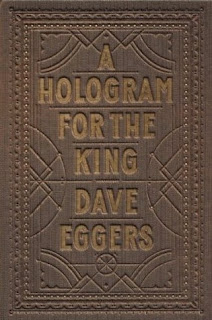A Hologram for the King
 Dave Eggers may be best known for founding the literary quarterly McSweeney's, but he's also a writer of novels, nonfiction, and a memoir, A Heartbreaking Work of Staggering Genius, that I read some years ago. I have just completed his latest novel, A Hologram for the King, and it's wonderful, kind of a cross between Death of a Salesman and Waiting for Godot.
Dave Eggers may be best known for founding the literary quarterly McSweeney's, but he's also a writer of novels, nonfiction, and a memoir, A Heartbreaking Work of Staggering Genius, that I read some years ago. I have just completed his latest novel, A Hologram for the King, and it's wonderful, kind of a cross between Death of a Salesman and Waiting for Godot.The protagonist is Alan Clay, a 54-year-old salesman (he started as a Fuller Brush Man) who is on the precipice of complete disaster. He owes thousands, and his daughter's tuition bill is due. He is now a consultant for a large technology firm, and is in Saudi Arabia to help make a presentation to be the IT firm for the King Abdullah Economic City, a municipality built from scratch. His firm will make the presentation directly to the King, and will include their holographic technology. If he can make the sale, Clay's problems will be over.
Except the wait for the King is nearly endless. Clay and his younger co-workers, who are actually the technicians, wait each day in a tent. They can't get wi-fi, the place isn't air conditioned, and there's no food. Some days Clay oversleeps and misses the shuttle from Jeddah, so he hires a car and ends up friends with the driver, Youssef.
As this Groundhog Day-like existence carries on, we peer into Clay's background. He was an executive at Schwinn bicycles, before they went under. He has a domineering and disapproving father. He has a growth on his neck that he is sure is deadly. He has made many bad decisions: "He did not have the money to pay her tuition for the fall. He could not pay her tuition because he had made a series of foolish decisions in his life. He had not planned well. He had not the courage when he needed it."
Eggers also says of Alan: "Now he was fifty-four years old and was as intriguing to corporate America as an airplane made of mud." So Alan Clay is a sad sack, but there's something intriguing about him. His bursts of energy, rare as they are, make us root for him. But time after time he is beaten down, especially on a trip to Youssef's home in the mountains, where he tells a stranger that he is in the CIA and nearly shoots a shepherd boy.
Alan is sort of the victim of everything modern in America. He's been nearly ruined by a simple mistake with a Banana Republic credit card, and his age has made him seem outdated. "Then again, was there ever a time when a young American wanted to learn from an older American, or anyone at all? Probably not. Americans are born knowing everything and nothing."
As beaten down as he is, Clay enjoys his stay in Arabia. He gets a chance to pilot a yacht, has a little (and chaste--he is now celibate) fling with a Danish woman, and is entranced by his female doctor, who treats him for the cyst on his neck. There is always an undeniable optimism in him, which is also quintessentially American.
Eggers writes in a terse, Hemingway-esque style, but comes up with some great similes, like: "Their hair was straight, their eyes wide-set, and each held her head out in front, low, like a hat hung on a hook."
A Hologram for the King is a one-volume look at the state of American business in a global economy, of the perils of growing old in corporate America, and a heartfelt look at one man's attempt to reverse his downward spiral. It's a very good book.


Comments
Post a Comment